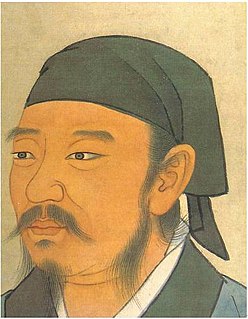A Quote by Ayn Rand
Since nature does not endow all men with equal beauty or equal intelligence, and the faculty of volition leads men to make different choices, the egalitarians propose to abolish the "unfairness" of nature and of volition, and to establish universal equality in fact - in defiance of facts. It is not equality before the law that they seek, but inequality: the establishment of an inverted social pyramid, with a new aristocracy on top - the aristocracy of non-value.
Related Quotes
Enforcing equality to compensate for the monstrous unfairness of nature destroys liberty.
But total liberty leads to various forms of "aristocracy" and decay.
Yet total equality leads to oppressive statism and decay.
However, equality of opportunity leads to a vibrantly chaotic and creative meritocracy.
I consider myself 100 percent a feminist, at odds with the feminist establishment in America. For me the great mission of feminism is to seek the full political and legal equality of women with men. However, I disagree with many of my fellow feminists as an equal opportunity feminist, who believes that feminism should only be interested in equal rights before the law. I utterly oppose special protection for women where I think that a lot of the feminist establishment has drifted in the last 20 years.
To rest the case for equal treatment of national or racial minorities on the assumption that they do not differ from other men is implicitly to admit that factual inequality would justify unequal treatment, and the proof that some differences do, in fact, exist would not be long in forthcoming. It is of the essence of the demand for equality before the law that people should be treated alike in spite of the fact that they are different.
the public sphere is as consistently based on the law of equality as the private sphere is based on the law of universal difference and differentiation. Equality, in contrast to all that is involved in mere existence, is not given us, but is the result of human organization insofar as it is guided by the principle of justice. We are not born equal; we become equal as members of a group on the strength of our decision to guarantee ourselves mutually equal rights.
From the fact that people are very different it follows that, if we treat them equally, the result must be inequality in their actual position, and that the only way to place them in an equal position would be to treat them differently. Equality before the law and material equality are therefore not only different but are in conflict with each other; and we can achieve either one or the other, but not both at the same time.
Instead of an aristocracy of wealth, of more harm and danger than benefit to society, to make an opening for the aristocracy of virtue and talent, which nature has wisely provided for the direction of the interests of society and scattered with equal hand through all its conditions, was deemed essential to a well-ordered republic.
The doctrine of equality! ... But there is no more venomous poison in existence: for it appears to be preached by justice itself, when it is actually the end of justice ... "Equality to the equal; inequality to the unequal" that would be true justice speaking: and its corollary, "never make the unequal equal".
The diversity of mankind is a basic postulate of our knowledge of human beings. But if mankind is diverse and individuated, then how can anyone propose equality as an ideal? Every year, scholars hold Conferences on Equality and call for greater equality, and no one challenges the basic tenet. But what justification can equality find in the nature of man? If each individual is unique, how else can he be made 'equal' to others than by destroying most of what is human in him and reducing human society to the mindless uniformity of the ant heap?





































